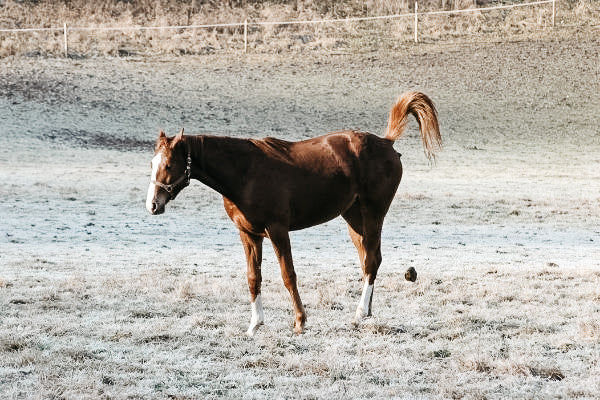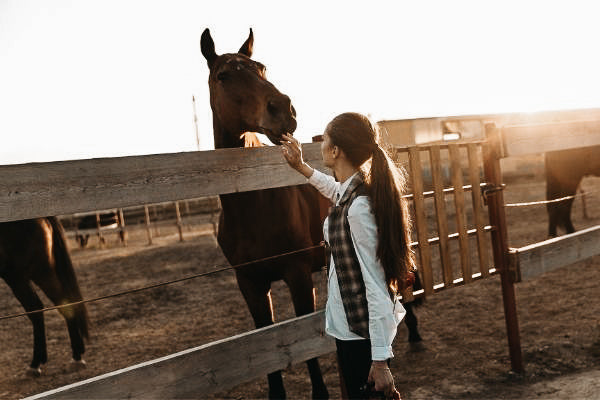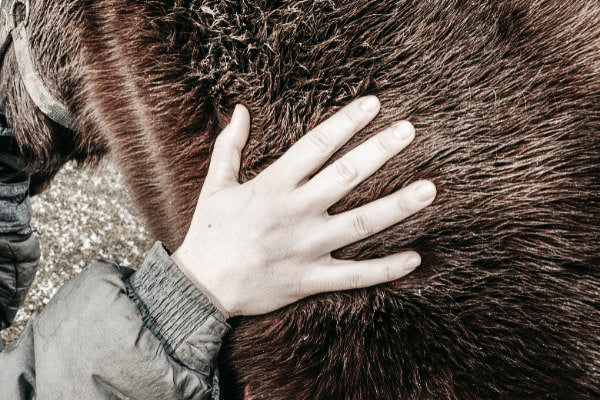If you and your horse are affected, you are probably holding on to every straw, no matter how small. Understandable.
Fecal water in horses - an unpleasant thing that is often accompanied by complete helplessness. Maybe we can give you some useful information that you may not have even thought of. Or, in the best case scenario, that will even help you and your loved one. That would be entirely in our spirit.
Is fecal water a horse disease?
No, it is not an independent disease of the animal. Rather, it is a reaction to a specific cause, which unfortunately ultimately has to be found. However, water in the feces can certainly occur as a “side effect” of an intestinal disease, for example, or a lack of vitamins/minerals. The following applies here: A clarification by a veterinarian is always advisable if your horse is generally lacking in fitness or has other symptoms (e.g. b Fever, loss of appetite, reluctance to move, restlessness, weight loss, etc.) to be added.
This can ultimately be a clear indication of a horse disease. The veterinarian will also check whether parasites or viral/bacterial causes can be ruled out. An allergy should also be taken into account and attention should be paid to whether the animal (often seniors) is sensitive to the weather. Nothing like that?

Let's look for other causes!
Keyword: horse feeding.
As we all know, what goes in at the front comes out at the back. True. It is therefore important to take a closer look initially.
What does your horse get for horse feed? Hay, haylage, silage, muesli, pasture all day with little hay?
There are so many options - which one is the right one?
Now every horse organism is different and not all animals automatically have the same metabolism. This can be genetic and health-related. For example, one horse tolerates hay ad libitum well and the other doesn't tolerate it at all. What is right for a well-trained sport horse may be too much for a less stressed recreational horse.
In a nutshell, this means: This is exactly why it is difficult to find the cause of water in the horse's feces. But back to horse feeding:
- Haylage, silage feed or general fermented feed
- Insufficient food chopping of coarse, strawy hay (Have your horse's teeth been checked yet?)
- Straw supplementary feeding/straw bedding
- food rations too large/too small
- Food supplement (Is the dose correctly adjusted to the weight of your animal?)
- Quality defects in hay/straw
- Switching from pasture feeding to pure hay feeding
- too much grain and/or too much pasture
- Flavors, binders, preservatives and colors
- Grazing and grazing
- too much concentrated feed
- rapid change in feed
could have an influence on the release of faecal water.

What now?
Pay close attention to what goes into the trough/rack! Convince yourself of the consistency and quality of the food. Only perfect horse feed is allowed into the horse! Avoid additives (see above) and stick to an appropriate nutrient intake (pay attention to zinc deficiency)! Maybe you can already achieve a lot with a gentle change in diet.
To do this, the intestinal environment should be strengthened again. It is advisable to add herbs to the horse's feed as a home remedy for fecal water. These counteract inflammation, stimulate the flow of bile and stabilize the intestinal flora. Flaxseed cake also has a positive effect on the intestines.
If horses have water in their feces, home remedies certainly have priority. Of course you want to help your sweetheart as quickly as possible and as gently as possible. Foods rich in pectin (e.g. b dried carrot and beetroot chips, apple pomace) or the addition of lignocellulose offer a way to drain the intestines.
Indian psyllium is also said to be a good choice. Its water binding ability is enormous. In any case, it is important to ensure that the dosage is correct, as these plant seeds swell significantly. Even sand can be transported out of the intestine in a targeted manner using the miracle particles. A home remedy with success for diarrhea or fecal water from horses. Interesting, right?
Speaking of water. Are your drinking troughs checked regularly and cleaned promptly? Is it tap water or well water? The latter requires recurring testing for drinking water quality! You can even get the test yourself from the pharmacy.
Stress - is this a cause of feces?
Yes. In fact, fecal water in horses does not necessarily have to be caused by feeding problems. Stress can also play a significant role and have a strong influence on “horse illness”.
- low rank in the herd
- not species-appropriate husbandry form
- Training and/or tournament stress
- General overload
- too long without food
- busy operation in the stable
- Separation from conspecifics
- Horses
- rosy mare near geldings/stallions (yes, this can stress geldings too!)
You see, water in horses' feces is a tricky matter. Nothing bad to a small extent, but if your loved one has constant or recurring problems with it, the origin of the whole thing should be investigated. And listen around. Treasures of experience are sometimes worth their weight in gold.





